1.
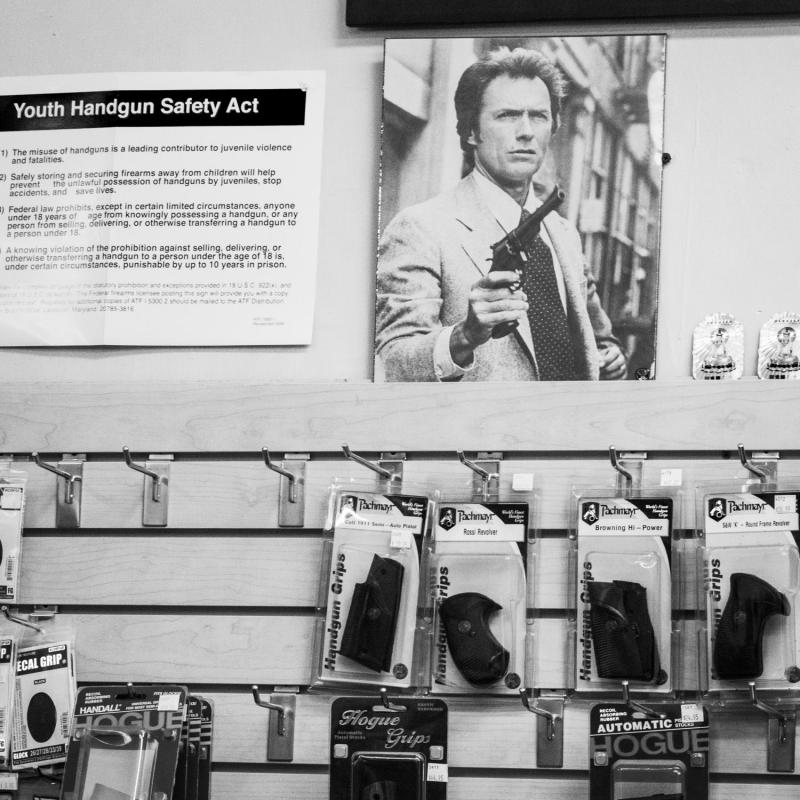
The week before it closes for good, High Bridge Arms feels both cluttered and bare. The rifles and shotguns that once lined a wall like ribs are gone, sold. So are the T-shirts (“SAN FRANCISCO’S LAST GUN SHOP”), which sold out within days of the shop’s story going viral: After six decades in the Mission District, High Bridge Arms would be closing, partly because of new city regulations that would require that all firearm sales be videotaped and reported to police.
You can still buy stuff here—grips, cleaning kits—but many of the racks are empty, their claw-like hooks less menacing than fragile-looking. The décor ranges from sober to cheeky: Paragraphs from California Penal Code Section 26835 are framed and posted around the sales floor; an enormous Texas state flag looms over the counter as an inside joke, a reminder of when a Bernal Heights protester told manager Steven Alcairo—a San Francisco native, and the store’s manager—to go back to Texas.
Alcairo used to work in the security sector. Private protection, he calls it. It shows. The atmosphere here is orderly; he’s perennially unfazed. And if, behind the counter, he comes across as quiet, efficient, beleaguered, polite, he’s also presiding over a very particular scene. Customers wait patiently on stools and bond—instantly, it seems—over what they have in common simply by being here.
“Yeah,” says one customer to another, pulling out some ammunition he brought in. “This is old ammo but it’s good ammo.”
“Holy god,” says the man next to him. “Did you seriously just give me a rusty round?”
“That was in my drawer,” says the first.
“Look at it—it’s not supposed to be that white,” says the second.
“Is it mold?”
“No, it’s not mold, it’s just very white.”
“This one was in my neighbor’s underwear drawer.”
They stare at it on the counter curiously.
2.
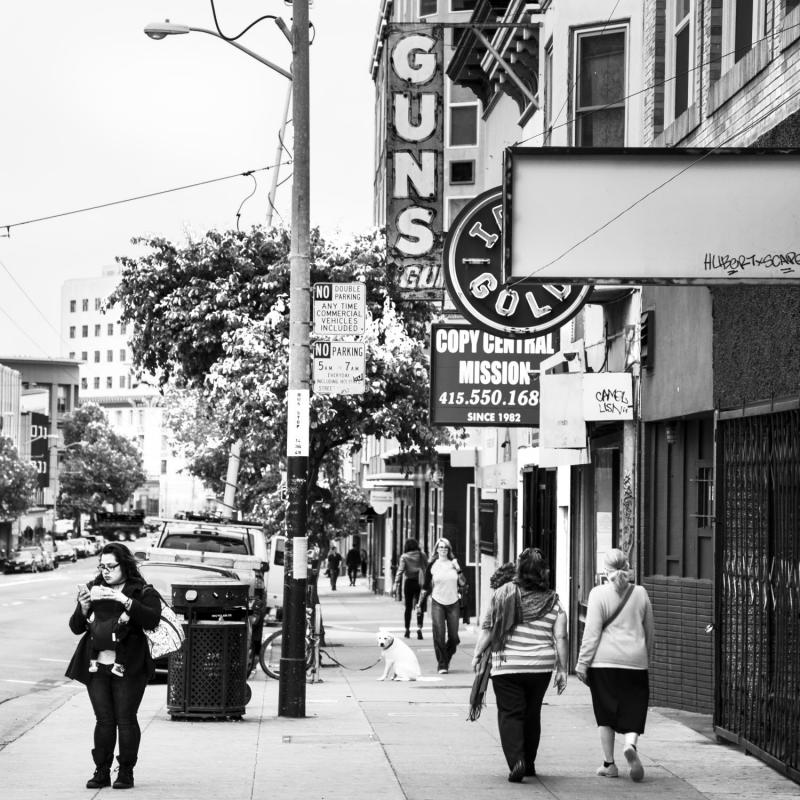
Dorothy, blonde and elderly, walks into High Bridge Arms and straight up to the counter, where Alcairo is flipping through a stack of paperwork. She bypasses the customers waiting on stools. “So,” she says to Alcairo, “you’re not going to open somewhere else?” Her voice is disapproving and precise.
“Not for a pretty good amount of time,” Alcairo says. “At least a year or two.”
“That’s terrible,” she says. “That’s awful. Anyway, thank you and best to you.”
“Thank you so much,” says Alcairo.
“That’s okay,” she says, and if it’s an odd response it also seems like exactly the kind of thing she’d say.
I ask Alcairo about regulars—who he decides to sell to and why, beyond the dictates of the background check. He decides by talking to people, he says. By getting a sense of who they are. If someone behaves oddly or in any way pings his radar, the staff ignores them until they go away. He refuses to sell to people who are clearly buying for others. The key is to make a point of connecting—chatting, getting to know someone and why they want what they want.
“That woman who just came in,” Alcairo says. “Dorothy something. I think she was in showbiz back in the day, like in theater. She’s not a regular, but she comes in every now and again for supplies—ammunition, gun oil. Her gun just sits more than she shoots it, and I think she shoots it on private land, somewhere up north.”
Dorothy’s gun was given to her by her father, Alcairo says, and she’s one of the customers chafing against the new restrictions. “She didn’t like the idea of leaving it somewhere for a background check considering she had it in her possession for fifteen years,” he says, “but it’s state law. So she did it.”
For Alcairo, it isn’t hard to distinguish legitimate buyers from the rest. “You can just tell, sort of. I’m not worried about her—a former stage performer, a very sweet woman. It’s people like her who try to stay off the radar, so to speak.”
“Dorothy,” he says. “I almost said her full name. She won’t like that.” He says it as if she were coming back.
3.
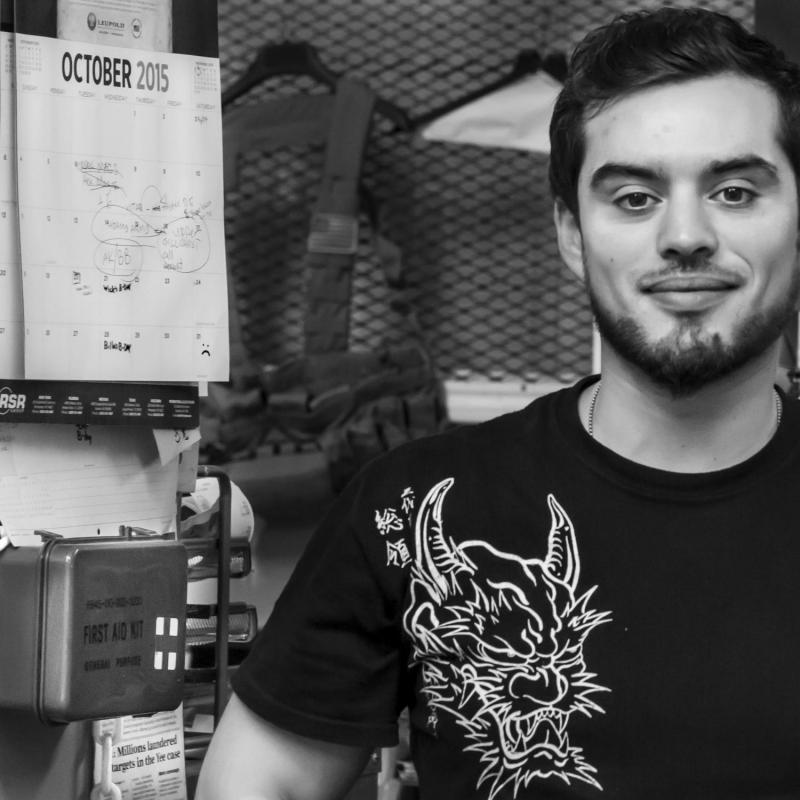
Someone has drawn a sad face on the staff calendar to mark the date High Bridge Arms closes for good. My guess is that it was Jon Lopez. An ex-Marine and San Francisco native, Lopez plays gatekeeper whenever he’s not behind the counter. He unlocks the door for each customer, checks their ID and lets them in—or doesn’t (a reporter for San Francisco’s KRON 4 was once turned away). As gatekeepers go, Lopez is quick and kind: Twice during my visits, he brings coffee back for the staff from the hip new coffee shop across the street.
I ask him why everyone seems so at ease here. It’s a relatively small community, he says, but it’s a mindset, too. “It’s like a skate shop, what we feel for what we do.”
Still, Lopez seems a little down the next time I visit, and his mood doesn’t quite seem to match the arc of the shop’s closure. Has he liked working here? “Sorta,” he says after a pause. “I imagine if I lived in Arizona and were doing this, I’d have a lot more fun.” Is it the protests? “There haven’t been protests,” he says. “We’ve gotten more support than anything else.”
I push a little more and he repeats—twice, three times—that he hates the paperwork: forty minutes per sale, at least. His dissatisfaction is basically Bartleby’s. Never mind the high drama guns promise, or the raging controversy High Bridge Arms inspired in its final days: Lopez’s frustration is essentially clerical.
High Bridge Arms’s Instagram account is inactive now, but one of the last posts shows Lopez blowing out candles on a cake decorated with a skull inside a diamond with five lopsided stars—the Marine Alpha Raiders insignia. For Lopez.
4.
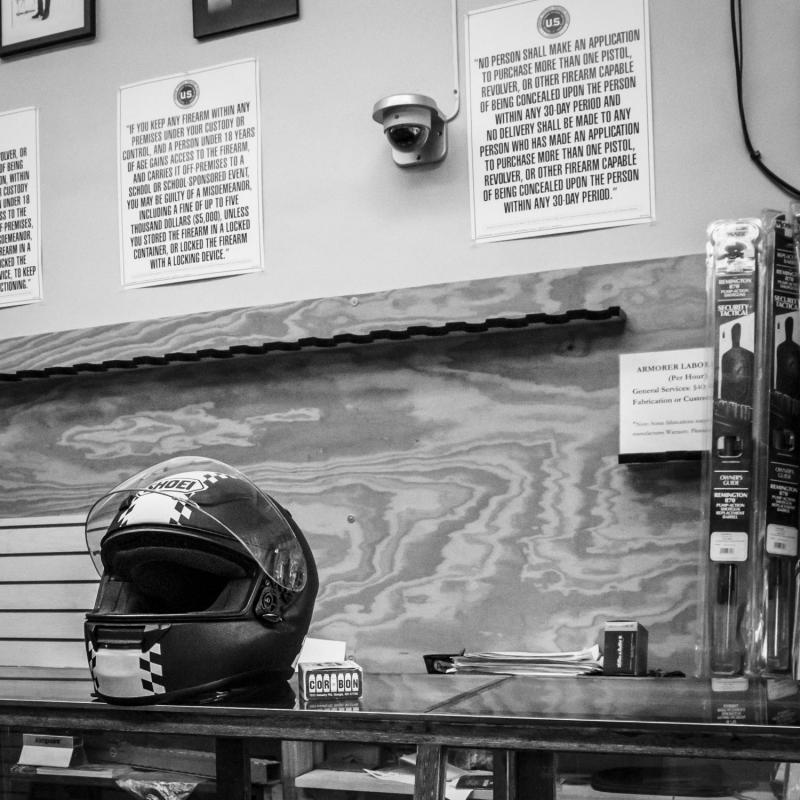
Police like to gossip at the gun shop on Mission Street. They don’t discuss the obvious or the general: You won’t hear about the store’s imminent closure or the changes in the neighborhood. Off-duty, out of uniform, they talk the way teenagers do in record stores. They chat. They confide. They lean on the counter. While a woman with a crewcut and hoodie talks to Alcairo, the cops talk about other cops.
“What’s he up to these days?”
“Surviving his marriage. He’s working the homeless park. He’s been working some overtime so he can get ahead, since his wife spends a little too much money. She’s staying home.”
“Sounds about right.”
The woman with the crewcut leaves, and I discover she’s a cop, too. “Q2,” one cop says. “She was giving some of us a hard time at Mission station.” Sit long enough and you become part of the landscape: One officer tells me about a tyrannical former city supervisor who torpedoed a friend’s coffee shop in North Beach just as it was about to open—everything was in order, but he hadn’t been personally consulted. “That’s how this town is,” he says, and sets his helmet on the counter. Alcairo walks over, and the cop perks up, hoping Alcairo will recognize him out of uniform. He does.
Alcairo tells me later that he often fills the cops in on suspicious activity at the shop. He even sometimes sends them video or snapshots he takes with his phone. He’s served as a witness in three court cases.
“What I’d like to see is more people being more active and being a good witness,” he says. “What we learned in private protection was how to be a great witness: When you walk down the street, take a look at the corner. Who stands out to you?” He gets quiet. “If more people did that, we would have more to give law enforcement. You know, my partner was shot. Nobody saw anything. How about that? Nobody saw a thing at the Fillmore—are you kidding? At 9 P.M. on a Saturday night nobody saw anything, not so much as a man running away? It’s ridiculous,” he says. “Yeah. Yeah.”
5.
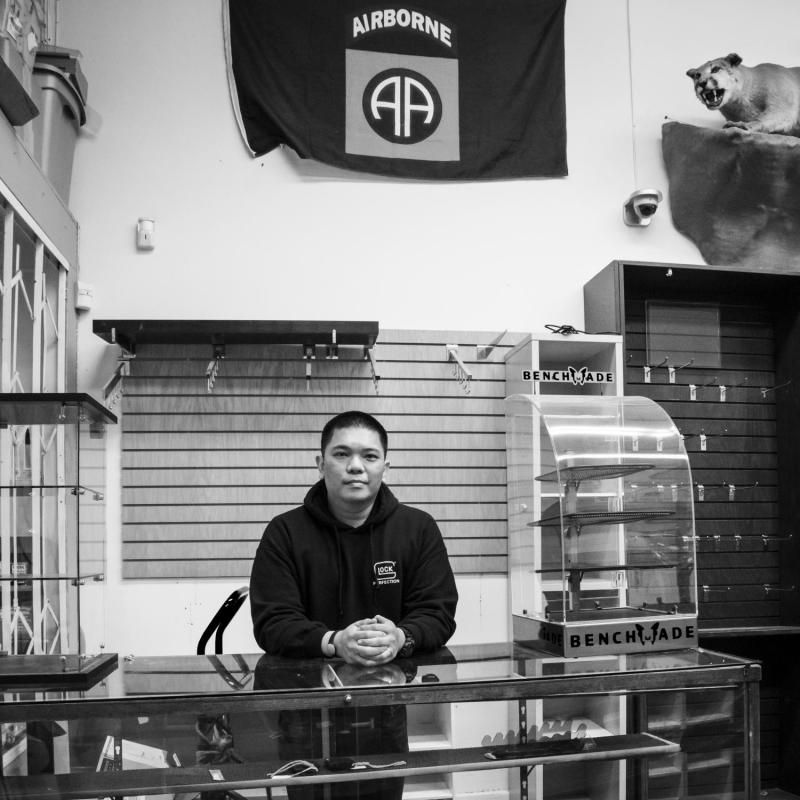
The story of High Bridge Arms’s closure is that of an overzealous city government regulating a gun shop out of existence. That story went viral thanks to Alcairo. Calm, intense, and media-savvy, Alcairo tells me he’s gotten several thousand e-mails since the story posted (he’s long since stopped answering the phones). He admits that the reasons circulating for the shop’s closure—a new city regulation mandating that sales be videotaped, something Walmart already does—don’t tell the whole story. The store’s owner, Andy Takahashi, is tired; Alcairo is, too. A lifetime of living in San Francisco prepared him for the peculiar aspects of running a gun shop there, but the experience has dented his relationship to the city. He’s just moved out of Bernal Heights after sixteen years.
“To where?” I ask.
“The city,” he says with half a smile, refusing to specify.
“Were you always a regular here?” I ask.
“You could say that,” he says. “When I first walked in here I was thirteen. It said Gun Store and I walked right through.” He was kicked out shortly thereafter for being without his parents, but he remembers. The shop was once home to a decent taxidermy collection, “with ducks and pheasants in the window.” Now only a mountain lion and crow are left. “Are you guys gonna sell the crow?” asks a blonde woman who needs help with a pistol. Alcairo politely tells her he isn’t sure.
“I’m disappointed,” he says to me later. “I’m disappointed in San Francisco. You know, we’ve championed a lot of things that are very unpopular to the rest of the nation: the decriminalization of marijuana, same-sex marriages. That’s terrific, that shouldn’t even have been something for anyone to vote on. Here we are defending all of those things that are very unpopular—but they make me synonymous with what goes on horrifically out there on the street every day. When someone gets killed in San Francisco on the street, they make me synonymous with that, and it’s ugly. I resent that with all of me.”
This essay is part of our #VQRTrueStory project, a social-media experiment in nonfiction that delivers stories across platforms. Each week, a contributor takes over our Instagram feed, @vqreview, to post original dispatches that tell the stories behind the pictures. The dispatches are then published on our website, and two are selected for inclusion in each issue of the magazine. You can visit the #VQRTrueStory archive to read all the contributions so far. And be sure to follow @vqreview to keep up with the project as it unfolds.







